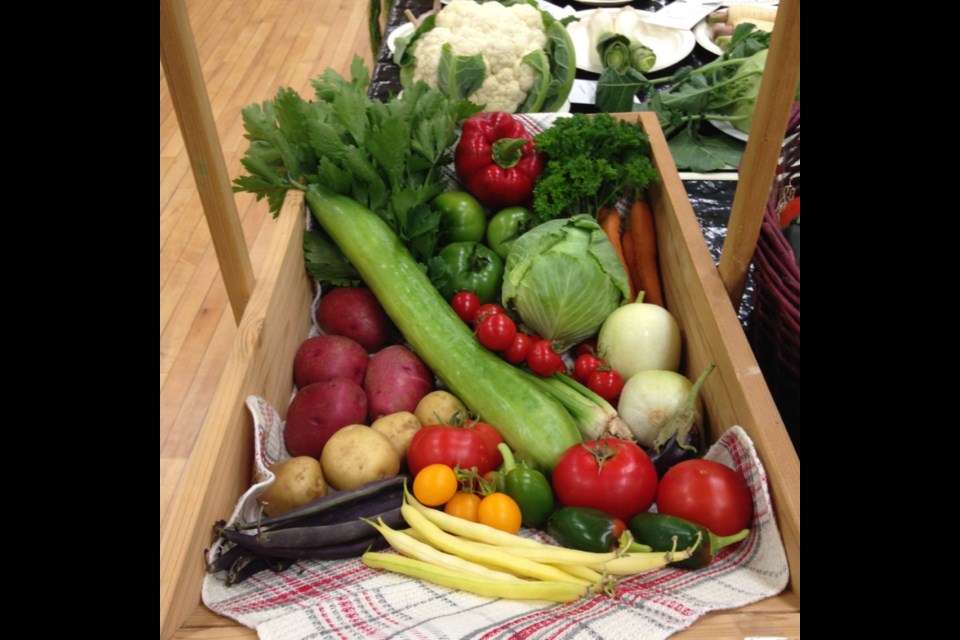People often join groups to share similar ideas, and information, enjoy camaraderie and develop friendships. Prairie gardeners have a long history of enjoying the company of fellow gardeners and learning from others how to and what the best plants to grow in our harsh Prairie climate.
In the late 19th and early 20th century, formal gardening groups or ‘Garden Societies’ as they were called, formed in many communities in Saskatchewan. Typically, these societies were formed by community leaders around a central flower or vegetable show. Local gardeners would bring the flowers, fruit and vegetables that they grew in their garden to show to other gardeners and community folk. Certain men in the society would be the ‘judges’ and awards would be handed out for the best specimens, based on previously outlined criteria. The shows were not only one way to brag about one’s garden but more importantly, it was a chance for gardeners to learn from each other about what vegetables, flowers and fruit could be grown. Since the original shows, the societies evolved to be a place where gardeners could influence local policies regarding community landscape, share ideas, trade plants and seeds and try to impress fellow gardeners with their gardening skills.
Some of the older societies in the province include; Regina Horticultural Society, founded in 1896 and Yorkton Horticultural Society (established in 1906). In 1927, the Saskatchewan Horticultural Association was formed to promote "the interest of horticulture generally and horticultural societies particularly". In 1928, the provincial government passed the Horticultural Societies Act, giving the University of Saskatchewan Extension Department responsibility for the general supervision of member societies. The department aided the societies with organization and training related to horticultural exhibitions, garden competitions, field days and demonstrations, home and town beautification, rural work and lectures on horticultural topics. The Saskatchewan Horticultural Association (SHA) is alive and active. Some of the current member societies of the SHA, besides Yorkton and Regina, include: Carrot River, Doghide River Garden Club (Tisdale and area), Kamsack, Tamarack Garden Club (Melfort), Indian Head, Norquay, Shamrock (Foam Lake), Tri-City (Nipawin), Spiritwood, Sturgis, Walter Willoughby (Parkside), Shellbrook, Swift Current, Weyburn, Windthorst, Wood River (McCord and area), Saskatchewan Perennial Society (based in Saskatoon) and the Prairie Peony Society (based in Regina).
The gardening societies have undergone a lot of change over the years. Initially, most of the society events were attended by men in business attire. The societies then became more popular with housewives who would share garden tips and show off their vegetables. Today, the societies often provide professional speakers for information nights and assist children or seniors in planting their gardens at their local school or retirement home. Members may get together to share recipes for their favourite garden produce or discuss a favourite gardening book. Some clubs spend their time planting community flower pots or maintaining a local public garden. Today’s members are of all ages, men and women, with many horticultural interests. Some members have a large garden, some have a balcony garden and some members have no garden at all.
The idea of calling the gardening group a ‘society’ has, perhaps, discouraged some of the younger generation from becoming members – giving the impression that there is a lot of tea and crumpets served with a healthy dose of gossip. Many gardening groups are renaming themselves as ‘gardening clubs’ to avoid this stigma.
I have been involved with a local society and the Saskatchewan Horticultural Association for the last fifteen years. I can assure you that I am not a fan of tea and crumpets and have never been offered tea and crumpets at a society meeting.
Being part of a society has helped me make gardening connections across the province. This province is rich with horticultural businesses and beautiful personal gardens that have become accessible to me because I am a member of a gardening society. If you love horticulture and you have the desire to learn more, join a local horticulture society or gardening club. What’s the worst that can happen? You might end up with a greener thumb.
This column is provided courtesy of the Saskatchewan Perennial Society (SPS; [email protected] ). Check our website (www.saskperennial.ca) or Facebook page (www.facebook.com/saskperennial) for a list of upcoming gardening events.
Keep your news a touch away by bookmarking The News-Optimist homepage at this link




